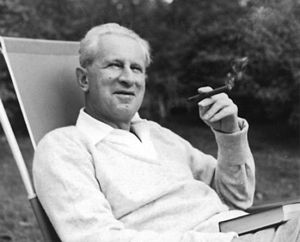
“Self-determination, the autonomy of the individual, asserts itself in the right to race his automobile, to handle his power tools, to buy a gun, to communicate to mass audiences his opinion, no matter how ignorant, how aggressive, it may be.”
Share this quote:
“The people recognize themselves in their commodities; they find their soul in their automobile, hi-fi set, split-level home, kitchen equipment.”
Share this quote:
“The web of domination has become the web of Reason itself, and this society is fatally entangled in it.”
Share this quote:
“Obscenity is a moral concept in the verbal arsenal of the establishment, which abuses the term by applying it, not to expressions of its own morality but to those of another.”
Share this quote:
“If mass communications blend together harmoniously, and often unnoticeably, art, politics, religion, and philosophy with commercials, they bring these realms of culture to their common denominator -- the commodity form.”
Share this quote:
“Freedom of enterprise was from the beginning not altogether a blessing. As the liberty to work or to starve, it spelled toil, insecurity, and fear for the vast majority of the population. If the individual were no longer compelled to prove himself on the market, as a free economic subject, the disappearance of this freedom would be one of the greatest achievements of civilization.”
Share this quote:
“That which is cannot be true.”
Share this quote:
“Not every problem someone has with his girlfriend is necessarily due to the capitalist mode of production.”
Share this quote:
“If the worker and his boss enjoy the same television program and visit the same resort places, if the typist is as attractively made up as the daughter of her employer, if the Negro owns a Cadillac, if they all read the same newspaper, then this assimilation indicates not the disappearance of classes, but the extent to which the needs and satisfactions that serve the preservation of the Establishment are shared by the underlying population.”
Share this quote:
If the worker and his boss enjoy the same television program and visit the same resort places, if the typist is as attractively made up as the daughter of her employer, if the Negro owns a Cadillac, if they all read the same newspaper, then this assimilation indicates not the disappearance of classes, but the extent to which the needs and satisfactions that serve the preservation of the Establishment are shared by the underlying population.
Share this quote:
Free election of masters does not abolish the masters or the slaves.
Share this quote:
Art breaks open a dimension inaccessible to other experience, a dimension in which human beings, nature, and things no longer stand under the law of the established reality principle...The encounter with the truth of art happens in the estranging language and images which make perceptible, visible, and audible that which is no longer, or not yet, perceived, said, and heard in everyday life.
Share this quote:
The danger of abusing the discovery of the truth value of imagination for retrogressive tendencies is exemplified by the work of Carl Jung. More empathically than Freud, he has insisted on the cognitive force of imagination. According to Jung, phantasy is ‘undistinguishably’ united with all other mental functions, it appears ‘now as primeval, now as the ultimate and most audacious synthesis of all capabilities.’ Phantasy is above all the ‘creative activity out of which flow the answers to all answerable questions’; it is ‘the mother of all possibilities, in which all mental opposites as well as the conflict between internal and external world are united.’ Phantasy has always built the bridge between the irreconcilable demands of object and subject, extroversion and introversion. The simultaneously retrospective and expectant character of imagination is thus clearly stated: it looks not only back to an aboriginal golden past, but also forward to still unrealized but realizable possibilities.
Share this quote:
The psychoanalytic liberation of memory explodes the rationality of the repressed individual. As cognition gives way to re-cognition, the forbidden images and impulses of childhood begin to tell the truth that reason denies.
Share this quote:
The revolution is for the sake of life, not death.
Share this quote:
The people that once bestowed commands, consulships, legions, and allelse, now concerns itself no more, and longs eagerly for just two things: bread and circuses!
Share this quote:
The people recognize themselves in their commodities; they find their soul in their automobile, hi-fi set, split-level home, kitchen equipment.
Share this quote:
The range of choice open to the individual is not the decisive factor in determining the degree of human freedom, but what can be chosen and what is chosen by the individual.
Share this quote:
“Timelessness is the ideal of pleasure.”
Share this quote: